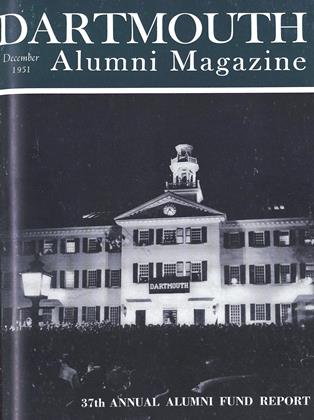"Gratuitous Warning"
To THE EDITOR: President Dickey's October 15 letter in TheDartmouth is an instance of prior censorship on the undergraduate daily that should not pass without notice. To my knowledge it is the first time that a President of the College has issued such a gratuitous warning in the 110 years of the paper's existence.
The occasion was an editorial in The Dartmouth attacking the high-handed removal by a Chicago dean of a so-called "Communist" student editor. President Dickey rejoined, in his letter, that such an attitude did not reflect College policy, and furthermore if a Dartmouth editor spent his summer behind the Iron Curtain and then came back to take up his duties in Robinson Hall, he would be similarly kicked out of office.
The need for such a letter by the President is highly questionable. In the first place, most readers know that the editor of The Dartmouth is not a spokesman for Parkhurst Hall; secondly, there was no provocation for the warning about removal, except in the most abstract realm of hypothesis; thirdly, while a student might be disciplined by the Dean for unsavory conduct, the President cannot take away his editorship of The Dartmouth, at least not according to the By-laws of 1939, unless the editor first loses his status as an enrolled student. As a distinct punishment, President Dickey cannot pull his chair of office out from under him. And finally, regardless of the merits of the Chicago case, it is something new for a student at Dartmouth to be summarily punished for his private political beliefs. However, such is the indication of the President's letter.
Mr. Dickey must know from his training and instincts that "general propositions do not fit concrete cases," and that such caveats, issuing forth in the absence of specific conduct, can only set a bad precedent, and serve to limit the healthy freedom of press which we have always known in Hanover. They also discredit their author, whom we have believed to be most admirably fair and reasonable in these matters.
New Haven, Ct.
Mr. Laskin was Editor-in-Chief of TheDartmouth in 1950-51. The President's letter to which he refers will be found printed in full on Page 13 of this issue.
No Sale
To THE EDITOR: The enclosed material from Alice Ames, Inc., has been received here by a number of Dartmouth men. Having at one time participated in the mail-order business, I know that these companies are able to purchase "names and addresses" from various organizations and therefore solicit without compiling their own mailing list.
Looking at the attached label, I would assume that this Alice Ames firm was able to gather a list of Dartmouth men from some current mailing list.
I realize how anxious the College has been to protect its graduates from any form of mail solicitation and possibly the "leak" has already been detected. If not, the College might like to pursue it further. Perhaps we would not have been so disillusioned if this outfit had simply sent a descriptive folder, but when they send a sample coaster and tell you that the set can be completed by sending $7.95 for the additional seven (or $1.25 for the sample), and ask for the return of the sample if you do not want to keep it, I think we have reached a new low in solicitation of Dartmouth graduates.
New York, N. Y.
The College has pot deviated from its policy of never making its alumni mailing list available for commercial purposes. However, the 1950 edition of the Dartmouth AlumniDirectory can be obtained and Dartmouth addresses apparently were taken from that source. The College has lodged a protest in this instance, but it obviously cannot control the outside use of a widely distributed alumni directory.
 View Full Issue
View Full Issue
More From This Issue
-
 Class Notes
Class Notes1917
December 1951 By KARL W. KOENIGER, DONALD BROOKS -
 Article
ArticleThe 1951 Alumni Fund
December 1951 By CHARLES J. ZIMMERMAN '23 -
 Class Notes
Class Notes1929
December 1951 By F. WILLIAM ANDRES, EDWIN C. CHINLUND, JACK D. GUNTHER -
 Class Notes
Class Notes1950
December 1951 By ENS. SCOTT C. OLIN, SIMON J. MORAND III -
 Class Notes
Class Notes1935
December 1951 By HENRY R. BANKART JR., JOHN WALLACE, SIDNEY A. DIAMOND -
 Class Notes
Class Notes1946
December 1951 By REGINALD F. PIERCE JR., ROBERT Y. KIMBALL
Letters to the Editor
-
 Letters to the Editor
Letters to the EditorCorrespondence More Occomiana
March 1936 -
 Letters to the Editor
Letters to the EditorLetters
February 1945 -
 Letters to the Editor
Letters to the EditorLETTERS TO THE EDITOR
JUNE 1963 -
 Letters to the Editor
Letters to the EditorLETTERS
June 1989 -
 Letters to the Editor
Letters to the EditorThe Absent Conservatives
September 1992 -
 Letters to the Editor
Letters to the EditorLetters
Jan/Feb 2010

